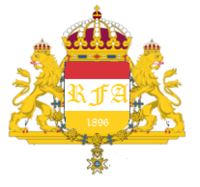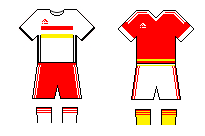Fluvique national football team
 | |
| General information | |
|---|---|
| Nation | Fluvique |
| Nicknames | The White Foxes, Les Tricolores |
| Home stadium | South Lane (90,000) |
| Trigramme | FLU |
| Colours | White, red and yellow |
| Association | The Royal Football Association |
| Staff and Players | |
| First international | |
| Assistant Manager | Rafael Cremonesi |
| Captain | Sam Gonza |
| Most caps | Jack Gabriel (104) |
| Most goals | Danny Pitt (54) |
| Kit | |
 | |
| Manufacturer | Adidas |
| Rankings | |
| KBP Rank | 63th |
| Official | 63 (Pre WC77) |
| World Cup | |
| Appearances | 0 |
| First appearance | Never qualified |
| Best result | Never qualified |
| World Cup Qualifying | |
| Appearances | 4 |
| First appearance | WC 73 Qualifying |
| Best result | 4th Place (WCQ 74) |
| Cup of Harmony | |
| Appearances | 4 |
| First appearance | CoH 65 |
| Best result | Fourth Place (CoH 66) |
| Baptism of Fire | |
| Appearances | 1 |
| First appearance | BoF 60 |
| Best result | Runner-up (BoF 60) |
| Olympic Games | |
| Appearances | 2 |
| First appearance | Games of the X Olympiad |
| Best result | Bronze medal (Games of the XI Olympiad) |
| The Yellow River Cup | |
| Appearances | 56 |
| Best result | Champions (1908, 1909, 1912, 1913, 1914, 1919, 1921, 1922, 1923, 1925, 1926, 1930, 1931, 1933, 1936, 1939, 1940, 1944, 1949, 1950, 1951, 1952, 1954 and 1955) |
The Fluvique national football team represents Fluvique in football and is controlled by the Royal Football Association (RFA), the governing body for football in Fluvique. Fluvique's home stadium is South Lane Stadium in Betham. The national team, also known as The White Foxes has appeared in four World Cup qualifiers, although never qualified for the final stage of the tournament. The team first official tournament was at Baptism of Fire 60, which they lost 3-2 to New Gelderland. Fluvique also is a regular in the Cup or Harmony, reaching semifinals at CoH 66. At the Olympics, the team won the bronze medal.
Fluvique also is a regular in the Cup or Harmony, reaching semifinals at CoH 66. At the Olympics, the team won the bronze medal. Fluvique main rivals are New Gelderland (after the BoF final), Nova Anglicana for recent matches in qualifiers group stages and neighbour countries of Cohina and Baho.
Contents
History
The first match ever recorder by Fluvique was against Baho. The game was held in Mevosa on 14 May 1900 and Fluvique won 4-3. During the first years of its existence Fluvique national team only played friendly matches against other neighboring nations. In 1908, in the context of the April Revolution's Centennial, a friendly cup was contested between Fluvique and Baho, won by Fluvique 3-2. That tournament eventually became the Yellow River Cup contested between the Football Associations of Fluvique and Baho from 1908 to 1960.
The White Foxes have appeared in four World Cup qualifiers, with a record of 11 victories, 8 draws and 16 defeats. The team has never qualified for the final stage and its best position were in the WC74 qualifiers, when they finished fourth. The first official international match was in the Baptism of Fire 60, when Fluvique defeated Transpadana 1-0. Les Tricolores advanced unbeaten to the final with four victories and two draws, before loosing 3-2 in the final.
The Olympic history of the team began in the Games of the X Olympiad. Fluvique was placed in Group B. The beaten 1-0 to Wray and 4-2 to Frenline Delpha and tied 0-0 to Mattijana. In round of 16, Fluvique defeated Welcomzia 2-1 in extra time, thanks a late goal of Paul Di Angello. In quarterfinals, the White Foxes lost with hosts New Gelderland to 3-1.
The Games of the XI Olympiad were the firsts with qualifiers. Fluvique defeated Free Swiss States with a overall result of 6-0. After loose 2-1 with Kaboomlandia, the team defeated them 3-1 and qualified for the Olympics Games. The White Foxes were placed in Group D. In their first match, they lost 2-1 to Eonstar. Then they defeated Ferkas by 4-0 and tied 1-1 to San Jose Guayabal. In the quarterfinales, they crushed Independent Olympic Athletes to 5-0. In the semifinals, the team lost on penaly shoot outs to Vilitan Union. In the bronze medal match, Fluvique tied 2-2 with Eonstar and 3-3 at extra time. Then, The White Foxes secured the medal winning 4-3 on penalty shootouts.
The White Foxes made their debut in World Cup 73 qualifiers. They had to wait until the sixth match to defeat Chiata at home. The team finished fifth. However, they were invited to the Cup of Harmony 65. Fluvique lost to Nassau-Hessen and Ko-Oren (both by 1-0) and tied 0-0 to New Gelderland, being eliminated in the group stage.
The World Cup 74 qualifiers were the best so far of the national side, winnning winning five matches and ending in the fourth position. The improvement continued in the Cup of Harmony 66. The team started loosing 3-1 to Falatulu, but then won 3-2 over Acronius and 3-0 over Whovian Tardisia. They qualified for the R16 after a 0-0 draw to Amazonesta. Then, the team beaten Chromatika on penalty shootouts. In the quarter finals, the White Foxes achieved one of its great feats, beating hosts Red Blackiland 1-0. In semifinals, the team lost 6-4 to Falatulu and 3-2 to Matthewsiania in the 3rd Place Playoff. Despite the defeats, the national side was received by thousands supporters at their arrival.
The World Cup 75 qualifiers began with a 4-3 victory to West-East Timor at home. However, Fluvique was five matches without a victory. Alfred Cook was sacked after five years in the bench and Danny Pitt became interim. The team finished sixth. Alexander Lavigne was hired to the Cup of Harmony 67. However, the team received another hard punch after being eliminated in the group stage. As aftermath, Alexander Lavigne resigned and Sam Gonza announced his retirement from international football.
World Cup 76
Shortly after the Olympic Games, Ricardo Carusso was confirmed as manager of the senior team. One of his first actions was travel to Abanhfleft to convice Sam Gonza to return to the squad. The captain published on his Facebook page that "If we have to suffer, let's suffer together" and announced his return. Gonza also called all other players who followed his resignation and convinced them to return to the team.
For this cycle, the Royal Football Association announced that three venues will be host qualifiers matches: The Little Box stadium, Mevosa; The Little Creek stadium, Port Elizabeth; The Circle stadium, Geneva; and King George Stadium, Greencastle. After the World Cup Committee banned the South Lane Stadium for a pepper spray attack over Abanhfleft supporters in the past qualifiers.
Fluvique started with two victories and one draw, to be leading the standings. Despite the last-minute defeat at home with Nova Anglicana, the team won two consecutive matches, before loosing with Semarland. The team had to win almost every single match to have a hope to reach a play-off spot. After that defeat, Fluvique won four matches in-a-row, including a historic win at Nova Anglicana by 2-0, scoring nine goals and only conceding one. Thus, the team earned a spot in the play-offs for the first time.
| Home | Score | Away |
|---|---|---|
| Semarland | 0-1 | Fluvique |
| Fluvique | 1-1 | Llanrhyddid |
| Vakolicci Haven and Celeria | 1-4 | Fluvique |
| Fluvique | 0-1 | Nova Anglicana |
| Vekaiyu | 0-1 | Fluvique |
| Fluvique | 3-0 | Azrea |
| Fluvique | 0-2 | Semarland |
| Llanrhyddid | 0-2 | Fluvique |
| Fluvique | 2-0 | Vakolicci Haven and Celeria |
| Nova Anglicana | 0-2 | Fluvique |
| Fluvique | 3-0 | Vekaiyu |
| Azrea | 1-2 | Fluvique |
| Home | Score | Away |
|---|---|---|
| Frenline Delpha | 0–1 | Fluvique |
| Fluvique | 0–0 | Frenline Delpha |
Kit history
Managers
| Dates | Name | Notes |
|---|---|---|
| 1925-30 | First manager | |
| 1930-31 | ||
| 1949-50 | ||
| 1950-54 | ||
| 1954-60 | ||
| 1960-68 | ||
| 1968-71 | ||
| 1971-83 | ||
| 1983-98 | ||
| 1998-00 | ||
| 2000-07 | ||
| 2007-09 | ||
| 2009-10 | ||
| 2010-16 | ||
| 2016 | Alexander Lavigne | |
| 2016- | Ricardo Carusso | Former manager of the women's national team. Interim for the Games of the XI Olympiad, then confirmed as manager of the senior team. |
Stadium
Competitive record
| World Cup | Round | Position | Pld | W | D | L | Qualifiers | Position | Pld | W | D | L |
|---|---|---|---|---|---|---|---|---|---|---|---|---|
| 73 | Did Not Qualify | - | - | - | - | - | 73 | 5th | 11 | 3 | 3 | 5 |
| 74 | Did Not Qualify | - | - | - | - | - | 74 | 4th | 12 | 5 | 2 | 5 |
| 75 | Did Not Qualify | - | - | - | - | - | 75 | 6th | 12 | 3 | 3 | 6 |
| 76 | TBD | - | - | - | - | - | 76 | 2nd | 12 | 9 | 1 | 2 |
